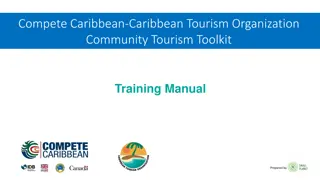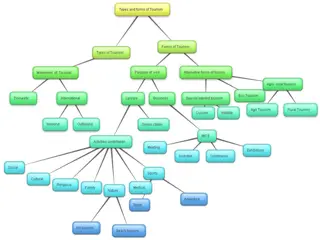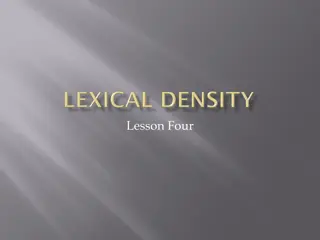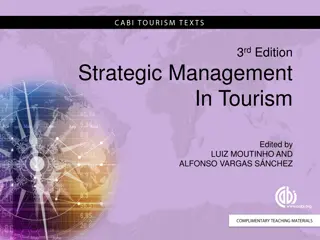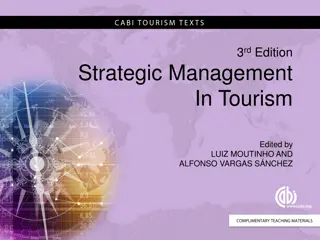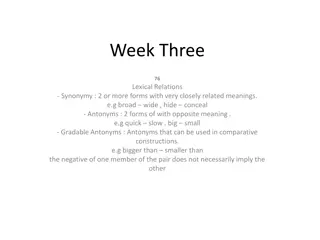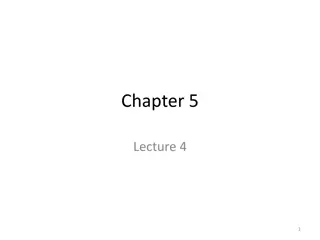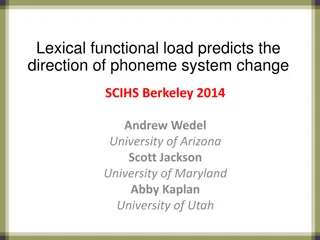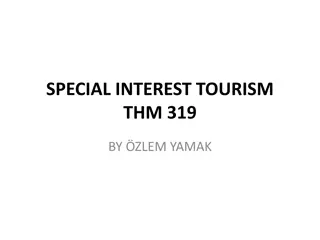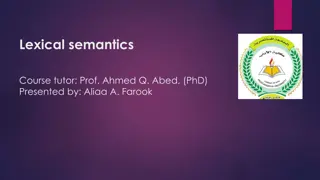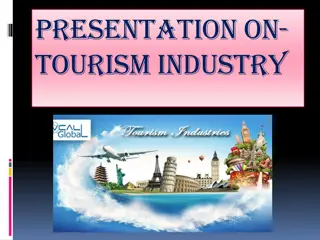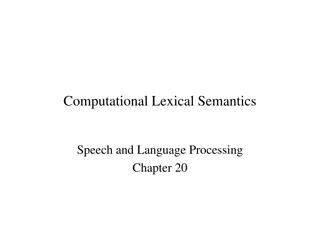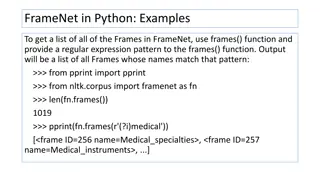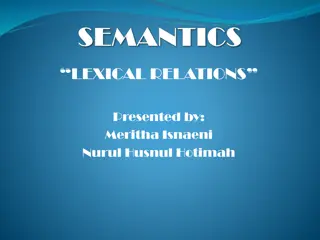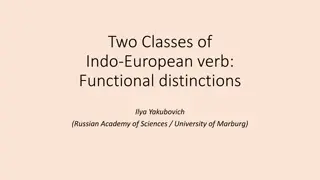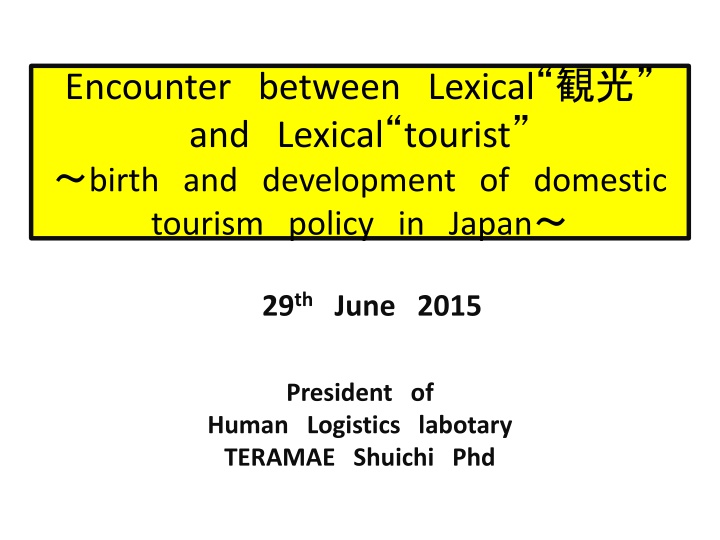
Development of Domestic Tourism Policy in Japan: A Historical Perspective
Explore the historical development of domestic tourism policy in Japan, from the birth of tourist concepts to the evolution of the lexical terms "tourist" and "tourism." Learn about the cultural significance and the changes in the translation and use of these terms over time, shedding light on the evolution of tourism in Japan.
Download Presentation

Please find below an Image/Link to download the presentation.
The content on the website is provided AS IS for your information and personal use only. It may not be sold, licensed, or shared on other websites without obtaining consent from the author. If you encounter any issues during the download, it is possible that the publisher has removed the file from their server.
You are allowed to download the files provided on this website for personal or commercial use, subject to the condition that they are used lawfully. All files are the property of their respective owners.
The content on the website is provided AS IS for your information and personal use only. It may not be sold, licensed, or shared on other websites without obtaining consent from the author.
E N D
Presentation Transcript
Encounter between Lexical and Lexical tourist birth and development of domestic tourism policy in Japan 29thJune 2015 President of Human Logistics labotary TERAMAE Shuichi Phd
The time of generation of concept is apart from the time it is used of lexical The word tourist was used by1772 and tourism by 1811. tour I Ching Japan The end of the 18th century development of the concept "tourism . Occurrence of Ise Shrine tour in 1770 is the leading theory AD441 513 ,Poet of the Southern Song era China Generation timing of the tourism concept in China, Ming Dynasty 1368 - 1644 second half
Occurrence of social need for the travel for fan which is distinguished from the rest of the journey Journey of nobility travel for fan Development of tourist concept Passive Active Final Popularization Inbound basis Intermediate goods Outbound basis consumption goods Literary theme Tourism economics
Japan Tourist Bureau 1912 Japan Tourist Bureau Was used is a lexical tourist, it is not a lexical tourism nor a lexical kanko What is included cross-border concept in the Tourist concept There is a need to proceed with the verification of the translated books and the original text of the tourism relationship in Edo and Meiji Period
Board of Tourist Industry In English Board of Tourist Industry not International tourism Bureau Not using Tourism Not using International In Japanese, international was used by Minister of railroad strong desire The original meaning of kanko was changed from outbound to inbound
Translation of Tourist As a concept tourism already exists in Japan. As lexical representing the concept, "sightseeing", tourism etc. were present. In the translation of the Edo-Meiji period, the translation of Tourist was a (tourist)" instead of sightseeing". What and why? In China, there is a concept tourism for a long time, it had been expressed in the lexical . Therefore, the translation of Tourist was .
From When Concept tourism Lexical sightseeing Lexical Lexical kanko(tourism) Lexical kanko( Tourism) kanko(tourism) Concept tourist into Japan Acquisition currency policy foreign of tu-rizumu Lexical Lexical (tourist) Board of Tourist industry 1930 Japan Tourist Bureau 1912 Lexical recreation absence of cross- The presence or border concept Synchro of Concept tourism and LEXICAL tourism Increase of inbound concept in tourism
Expansion hypothesis of "tourism" concept Hypothesis outbound only inbound emphasis Hypothesis cross-border concept non-discriminatory To affirm or deny the hypothesis Quantity analysis of lexical use of the Edo-Meiji Period- is required Printed literature is 2-3%. Scientific empirical analysis is difficult. For the time being the use of the newspaper article search Literature analysis remains in the supplementary materials
Outbound inbound hypothesis In the era of privilege class has the fun of travel, the concept "tourism" would be outbound concept Through the popularization of the fun of travel, industry, the tourists were targeted to grow, inbound concept has been established (hypothesis) In the case of Japan, we used lexical the "tourism" as representing the inbound.
howing the light of the country." As examples of "showing the light of the country", there is an example that says the concept of age Festival in 1895. Have appeared conscious that indicates the light of the country to foreigners here. In 1915, historical landmark scenic natural monument Preservation Society was established. Description "exert the country of light" was seen at that time.
Cross-border concept hypothesis Contemporary border concept was established after the First World War. Country indicated by the I Ching is an urban concept. There is a tourist map of the local tourism association has been issued in 1938. This map has been described as "border tourist map." Although not an international, it is stuck in the "country". It has refers to the country in the Japan of the Edo era.
In Japan Tourist Bureau, the lexical "sightseeing", "tourism", and the like of it used the way At the time when Board of Tourist Industry was installed, in general society, examples of the lexical "sightseeing" and lexical "tourism" were not established At the time, the Ministry of Railways and Japan Tourist Bureau officials were an expert. Even more, the general public, was considered to be not reached the stage of selectively using the sightseeing and tourism. This is currently used "tourism, sightseeing, excursions, migration" is the same in.
Comparison of the frequency of use between sightseeing() and tourism( ) through Asahisimbun articles database period sightseeing tourism
First example in addition to proper noun 15thautumn 1895 WATCH THE LIGHT WITH PARKING A HORSE ( )
Example of the use of tourism (Asahi Shimbun) After the war - Showa last stage only 5 articles
Local tourism association From 1934 around, the Ministry of Railways and stressed the public health movement. For League members of the local tourism association, subsidies have been paid from the International Tourism Bureau. Free ride card has been paid to the district representative. The supposedly, in order to distinguish between intelligence, it is emphasized to unify the response to foreigners.
Kyoto City 1930 To set up a Tourism Division 1935 The name, it will change from sightseeing city to tourist city
Tokyo Prefecture In Tokyo Prefecture, it had conducted a tourism administration in Natural Park Division of Construction Bureau. Tokyo Prefecture Tourism Association was established in 1936.
The mechanism for the generation of domestic tourist destination Acquisition of foreign currency Inbound "Tourist" destinations Outbound Going on a pleasure jaunt Deployment of international tourism administration Domestic tourism (Facility development for foreigner) International tourism (Overseas tourist propaganda) For western people Hotel Western Bathing beach Ski resort Westernization Popularization Health recreation Relativize Differences Lifestyle clear Public stance Ryokan Japanese Sumo Playhouse Development and deployment of welfare administration For Japanese Real intention The inner main outside follow
Expansion of the post-war domestic tourism administration Wartime Nominal of welfare administration 1940 Recreation and sports administration Ministry of Education Tokyo Olympic Games National Sports Festival World Recreation tournament After the war, in "Social Education Law, public hall law, library law", the lexical "recreation" is used. National recreation tournament A c c e s s National youth hostels National holiday village Excursion Hiking Recreation ( ) Ministry of Health and Welfare Social tourism Ryokan government Onsen government A c c e s s Resort Law Local Association (Tourism, scenic beauty) Popularization of international tourism inn (Internal main outside follow) International Tourist Hotel Improvement Act Travel mediation law (For foreign tourists) Reduction for Department of Transportation (Ministry of Railways) International tourism administration Japanese Travel Agency Law (For Japanese)
Cause that was delayed overall development of regional tourism policy research Under '55 regime, the former tourism Basic Law was excluded the "holiday problem" Hotel Business Law is a law of the Ministry of Health and Welfare. At the same time, international tourism hotel Improvement Act is a law of the Ministry of Transport. Therefore, double administration has been carried out About Resort law, many tourism policy researchers to perform the evaluation of pandering to the press, and that the depth of the institutional evaluation did not progress Regional tourism policy researchers did not think in a row "before the war, during the war, after the war."
Rural-stay leisure activities Environment-friendly nature experience activities Tendency to repel "tourism" as a legal term affected the post-war domestic tourism. Okinawa Promotion Special Measures Law, which was enacted in 2002, defined environment conservation nature experience activities. Both, by repelling the lexical "tourism", it is coined. Rather, tourism researchers, indifferently, use lexical "agritourism, ecotourism"
Comprehensive recreation area Improvement Act (Resort Act) This law is not a mere campaign, it was defined for the first time of the overall concrete policy on tourism (power act). In this law, lexical "tourism" does not come appear at all Regional Tourism Policy researchers, who are often lacking in institutional recognition possessed by this law could not develop a discussion Concept "tourism" had appeared in this law. However, that lexical "tourism" was not used, it was fortunately in the development of the tourism policy of the Koizumi Cabinet
To reflect the difference at the time of the lifestyle, "tourism for Western people business" and "tourism for the Japanese" was quite different. Therefore, it is difficult to selectively use the polite fiction and the real intention. Therefore, as can be seen also in the documentation for Tokyo Prefecture tourism association, it was decided that with the "Welfare (Recreation"), of the tourism "Our main outside subordinate" is told.
If the concept of Tourism translation was a lexical "sightseeing", deployment of Japanese tourism administration might have changed.


